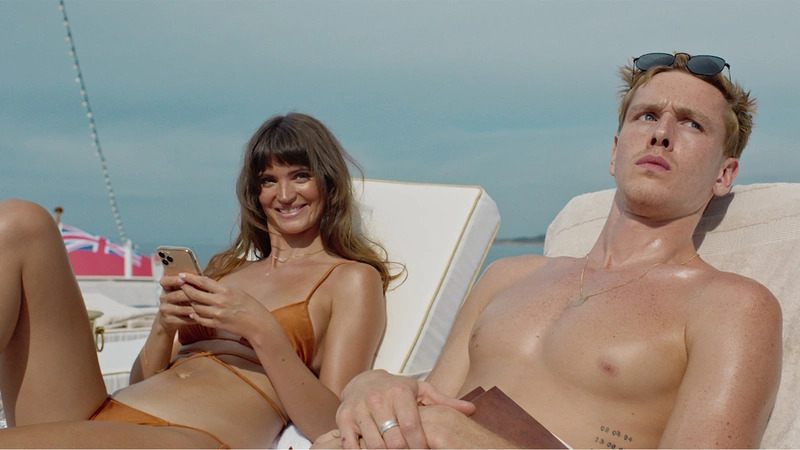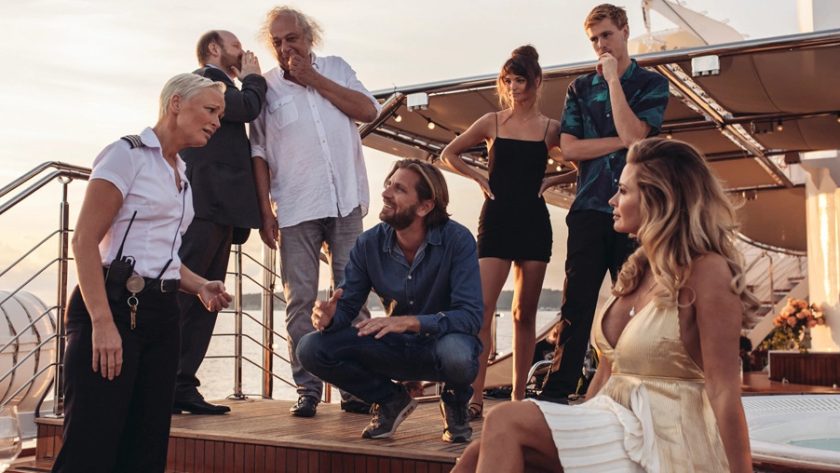The FilmSoc Journal is back for the 75th edition of the largest film festival in France, delivering a look at the hits and misses of the 2022-23 season.
◯ Warning: this review contains spoilers.
Dominic Ko reviews the Palme d’Or dramady which explores inequality in three settings – the fashion industry, a yacht, and an island.
Watching Triangle of Sadness, on the last day of the Cannes Film Festival, has got to be one of the best theatrical experiences I have had the privilege of being part of. The theatre roared in laughter, applauded together, and everyone became a unified collective watching the director, Ruben Östlund, peel back layers of society while critiquing gender roles, inequality, and beauty as a currency.
Without giving away too much of the plot, here are some thoughts on this year’s Palme d’Or, the highest prize awarded at the film festival. The film is divided into three acts, exploring inequality in three settings – the fashion industry, a yacht for the super-rich, and an island where the yacht passengers have been marooned. Each setting dissects our hierarchical social constructs and explores beauty as a currency, in three different environments where the value of the currency differs.
Right from the beginning, the film grips your attention fast, by throwing you right into an exhilarating modelling audition for a high fashion brand. Our lead, the struggling male model, Carl (Harris Dickinson) is introduced, along with the film’s title – The Triangle of Sadness, a fashion term referring to the creases between one’s eyebrows. The first act of the film tears apart the absurdity of the fashion world, poking fun at both disposable fast fashion and unaffordable luxury brands. Carl’s girlfriend, a successful model and influencer, Yaya (the late, Charlbi Dean) has dinner with him, and their dinner conversation skewers his male ego. In one of the few industries where women significantly outearn men, Carl is livid that Yaya presumptuously assumes he would pick up the dinner tab. Their subverted relationship dynamic, where Carl is constantly made to feel inferior, is a conflict that Östlund would continue to explore in the subsequent two acts.
As an influencer, Yaya is invited onto a luxurious yacht cruise, along with Carl, and that is where the second act of the film is set. Woody Harrelson, in a minor role, plays the perpetually drunk captain, who leaves all the heavy lifting to be done by the Chief Steward, Paula (Vicki Berlin). The yacht’s crew are constantly bombarded by absurd requests by the ultra-rich guests, such as Vera (Sunnyi Melles) who insists the entire crew shirk their duties and go swimming. Paula, who has conditioned her staff to respond only with enthusiastic ‘Yes’s, has no choice but to oblige Vera’s request, made on a whim to virtue signal. Through the guests’ outlandish behaviour, Östlund reinforces the inequality between the social classes onboard the ship, encouraging the audience to hate the rich, and sets up a cathartic ‘explosive’ sequence. In the midst of the chaotic climax, Woody Harrelson and Zlatko Burić, playing a Russian oligarch, spew communistic and capitalistic opinions. The unsubtle philosophical debate may be too on the nose, but Zlatko Burić’s superb delivery provides some of the film’s best lines.

It is hard to follow up from the insane, dramatic climax of the film, but the third act of the film tries its best as it upends the social hierarchies established earlier in the film by marooning its guests on a deserted island. In this new microcosm, the rich and powerful relinquish their influence over to the yacht’s Filipina toilet manager, Abigail (Dolly de Leon), who has the necessary hunter-gathering skills to keep everyone alive. Dolly’s ‘scene-stealing’ performance carries the third act, and I really appreciated how her character serves to recognise the labour of many Filipino migrant workers around the world. Abigail was such an empowering character and I am proud of how it celebrates Overseas Filipino Workers (OFW) who often fill the demand for unskilled, low-paid domestic work in high-income countries, both in the west and in Asia. Although some felt that third act was repetitive in the themes displayed earlier in the film, I thought it wrapped up the issues introduced earlier very well. The dynamic in Carl and Yaya’s relationship switches gears as beauty as a currency takes a new meaning in this fresh environment. The sharp social critique of the rich continues, but this time, third time’s the charm, it successfully sells the message that by taking away the value of money, everyone is equal. The film concludes in a powerful manner that epitomises the golden rule of ‘Show, Don’t Tell, and leaves the audience with lots to think about, and much to discuss.
As a dark-comedic satire, Triangle of Sadness soars as a brilliant, scathing critique of the rich and beautiful. As Östlund described in the press conference after the film, he was aiming to make a ‘roller-coaster for adults’, and succeedingly he did. Combining the intellectual, philosophical nature of European cinema, and the octane-high entertainment of Hollywood, I foresee Triangle of Sadness to be a hit worldwide. My theatre was roaring in laughter as we were screaming “Eat the rich” in our minds. The experience was akin to watching a live football game and I highly encourage it to be seen in a crowded theatre. A laptop or home viewing will not cut it. It is no surprise the film won the coveted, Palme d’Or, but one cannot help but think of how ironic this is, considering the opulence of the Cannes Film Festival, with the ultra-rich attendees parking their super yachts right outside the theatres. Nevertheless, what the film lacks in subtlety, it makes up for in sheer entertainment, and I am confident the film was as fun as it was to make, as it was to be seen.
Triangle of Sadness is out now! Watch the trailer here:




